If you’re interested in learning about artificial intelligence, then you’re in luck. Harvard University is offering 10 free online courses on the subject. These courses cover a wide range of topics, from machine learning to natural language processing.
Whether you’re a beginner or an experienced AI professional, there’s a course here for you. And the best part is, they’re all free! So what are you waiting for? Start learning today!
These courses are taught by some of the leading experts in the field of AI, and they cover the latest research and developments. So if you’re serious about learning about AI, then these courses are a great place to start.
1. Introduction to AI with Python:
- “Introduction to AI with Python” is a beginner-friendly course that introduces participants to the world of Artificial Intelligence using Python programming.
- Through practical projects and hands-on exercises, learners will delve into essential AI concepts, such as machine learning, deep learning, natural language processing, and computer vision.
- No prior AI or Python experience is necessary, making this course accessible and suitable for individuals with various backgrounds and skill levels.
- By the end of the course, students will be capable of implementing AI algorithms in Python and building AI-powered applications for real-world scenarios.
- The course also emphasizes the ethical considerations surrounding AI development, providing learners with a well-rounded understanding of responsible AI implementation.
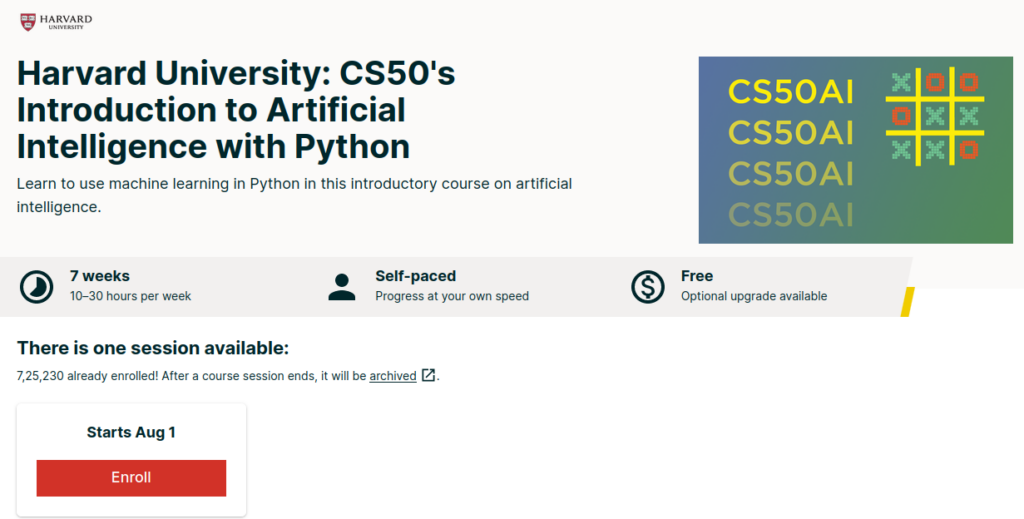
https://www.edx.org/course/cs50s-introduction-to-artificial-intelligence-with-python
2. Introduction to Computer Science:
- “Introduction to Computer Science” is a foundational course that offers a comprehensive overview of the principles, theories, and fundamental concepts of computing.
- Participants will explore key topics such as algorithms, data structures, programming languages, and the theoretical underpinnings of computation, enabling them to develop a solid understanding of how computers work and how they can be utilized.
- This course caters to learners of all backgrounds, including those with little or no prior programming experience, providing a gentle entry point to the world of computer science.
- Through hands-on coding exercises and problem-solving challenges, students will acquire practical programming skills and develop the ability to design efficient solutions to real-world computational problems.
- Beyond coding skills, the course also highlights the broader implications of computer science in various industries, encouraging critical thinking about the ethical, social, and economic impacts of technology in the modern world.
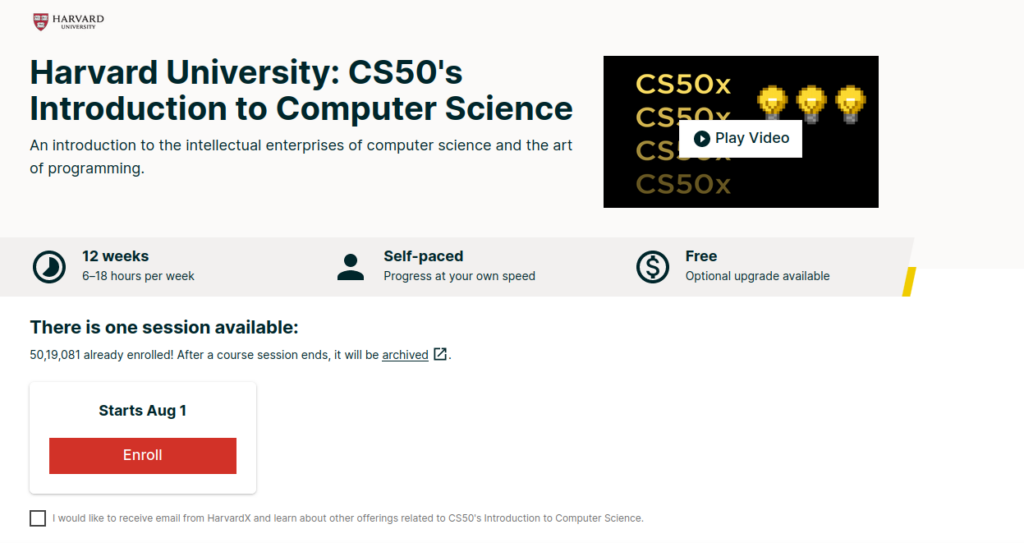
https://www.edx.org/course/introduction-computer-science-harvardx-cs50x
3. Artificial Intelligence in Business: Creating Value with Machine Learning:
- “Artificial Intelligence in Business: Creating Value with Machine Learning” is a specialized course tailored for professionals seeking to harness the power of AI and machine learning to drive business growth and innovation.
- Participants will gain a deep understanding of how AI and machine learning technologies can be strategically applied to various business domains, including marketing, finance, operations, and customer service.
- Through practical case studies and real-world examples, learners will discover how to identify business opportunities where machine learning can create value, optimize processes, and enhance decision-making.
- The course will equip participants with the skills to design and deploy machine learning models, enabling them to extract valuable insights from data, predict trends, and make data-driven recommendations.
- With a focus on practical implementation, this course empowers business leaders to stay ahead of the curve, leverage AI-driven insights, and effectively integrate machine learning solutions to gain a competitive edge in today’s rapidly evolving business landscape.
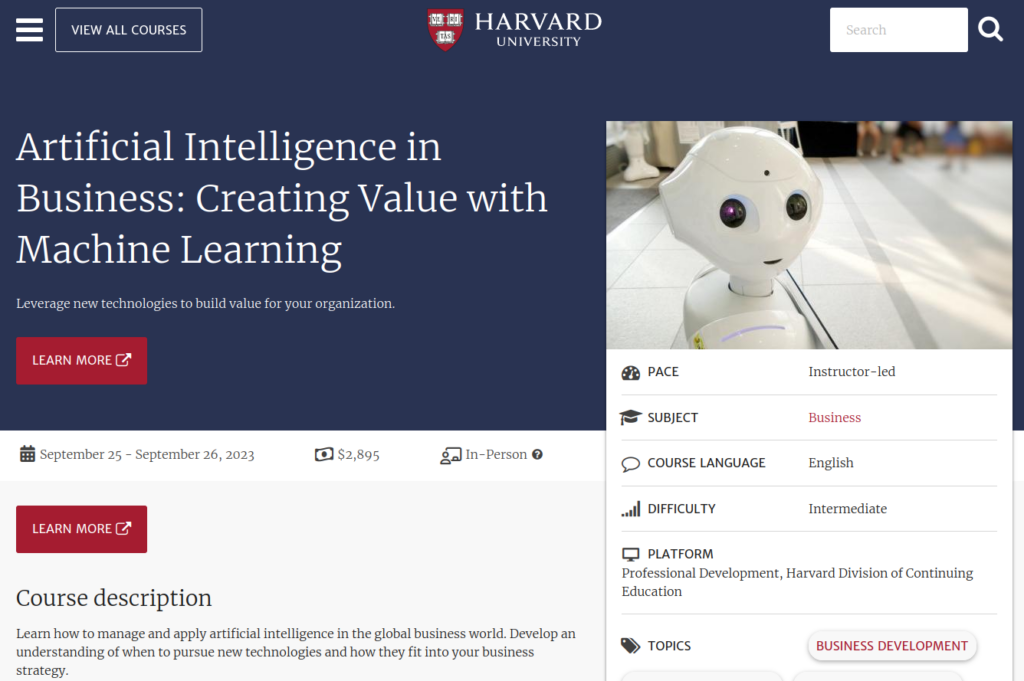
https://pll.harvard.edu/course/artificial-intelligence-business-creating-value-machine-learning
4. Mobile App Development Course:
- The “Mobile App Development Course” is a comprehensive program that focuses on building cross-platform native mobile applications using React Native, a popular JavaScript framework.
- Participants will gain proficiency in JavaScript, a fundamental programming language for mobile app development, and learn how to write efficient, reusable, and scalable code for their applications.
- The course covers essential topics such as debugging techniques, working with components, managing props and state, and applying styles to create visually appealing and user-friendly mobile interfaces.
- Students will explore crucial mobile app development concepts, including handling user input, managing views, and implementing various functionalities, enabling them to create feature-rich and interactive mobile apps.
- With a hands-on approach and practical projects, learners will develop the skills necessary to create real-world mobile applications that can run seamlessly on both Android and iOS devices, empowering them to pursue a career as a professional mobile app developer.
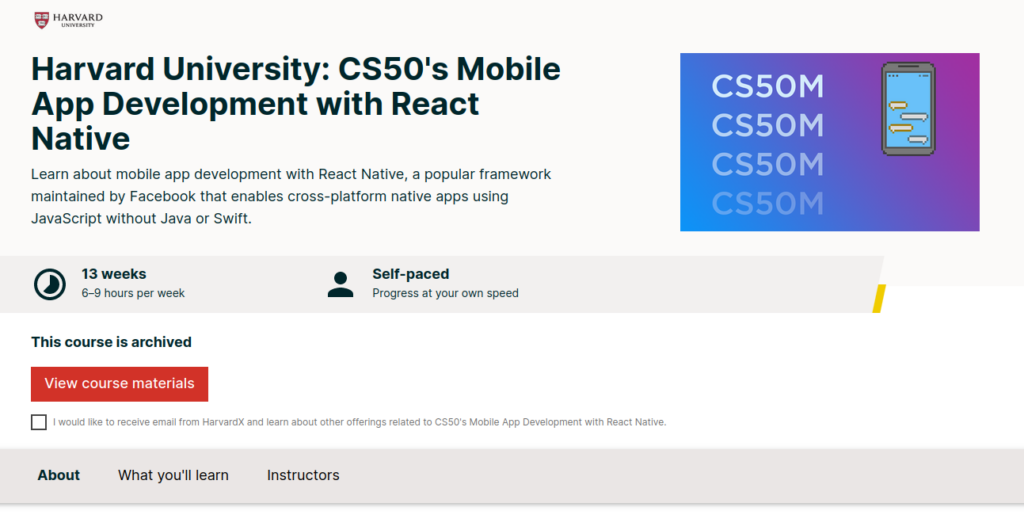
https://www.edx.org/course/cs50s-mobile-app-development-with-react-native
5. Data Science: Machine Learning:
- The “Data Science: Machine Learning Course” is a comprehensive and in-depth program designed to equip participants with the knowledge and skills needed to excel in the field of data science and machine learning.
- Students will gain a solid understanding of the foundational concepts of data science, including data preprocessing, exploratory data analysis, feature engineering, and model evaluation, providing them with a strong basis for machine learning applications.
- The course delves into various machine learning algorithms, such as linear regression, decision trees, random forests, support vector machines, and neural networks, empowering learners to choose and implement appropriate models for different data-driven tasks.
- With hands-on projects and real-world datasets, students will apply machine learning techniques to solve practical problems, enabling them to develop a portfolio showcasing their proficiency in data science and machine learning.
- The course also emphasizes the importance of ethical considerations in data science and machine learning, preparing participants to tackle issues related to data privacy, bias, and fairness while developing responsible AI solutions. Upon completion, students will be well-prepared to pursue rewarding careers in data science and contribute meaningfully to the ever-evolving landscape of machine learning applications.
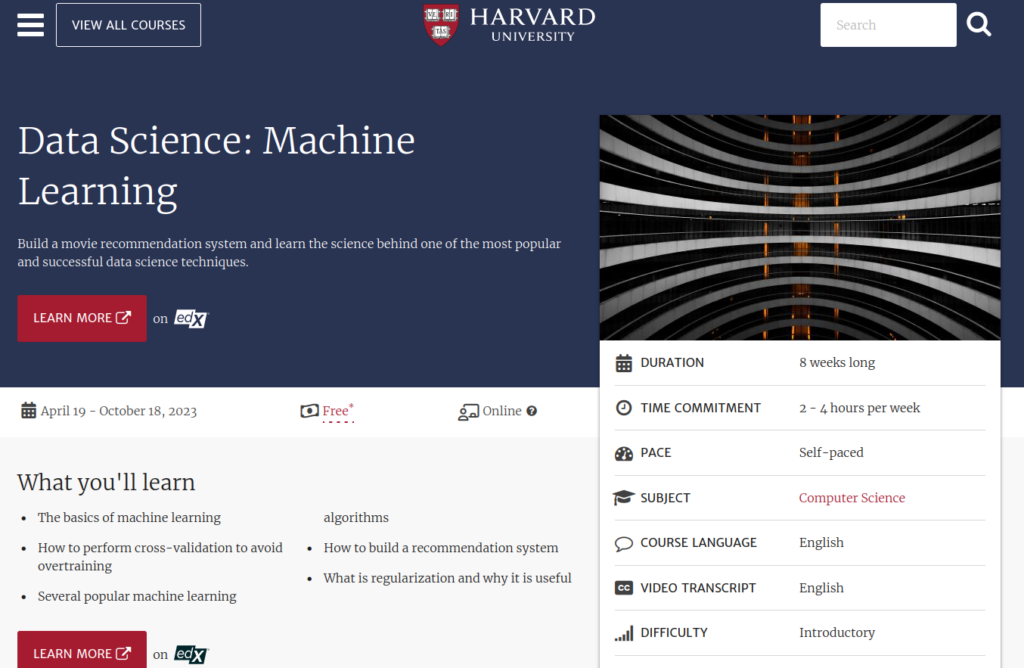
https://pll.harvard.edu/course/data-science-machine-learning
6. CS50’s Introduction to Programming with Python:
- “CS50’s Introduction to Programming with Python” is a comprehensive course that introduces learners to the world of programming using the Python language, one of the most versatile and widely-used programming languages in the industry.
- Participants will gain a solid foundation in Python programming, learning essential concepts such as variables, data types, loops, conditional statements, and functions, enabling them to build a strong programming skillset.
- The course offers a unique blend of practical applications, allowing students to explore Python’s versatility in various domains, including data science, web programming, and general-purpose programming.
- Through hands-on projects and assignments, students will apply their Python knowledge to real-world scenarios, creating data analysis scripts, building interactive web applications, and developing functional programs.
- Whether one aims to pursue a career in data science, web development, or software engineering, this course serves as an excellent starting point, providing learners with a well-rounded understanding of Python’s capabilities and its potential in powering diverse applications across different industries.
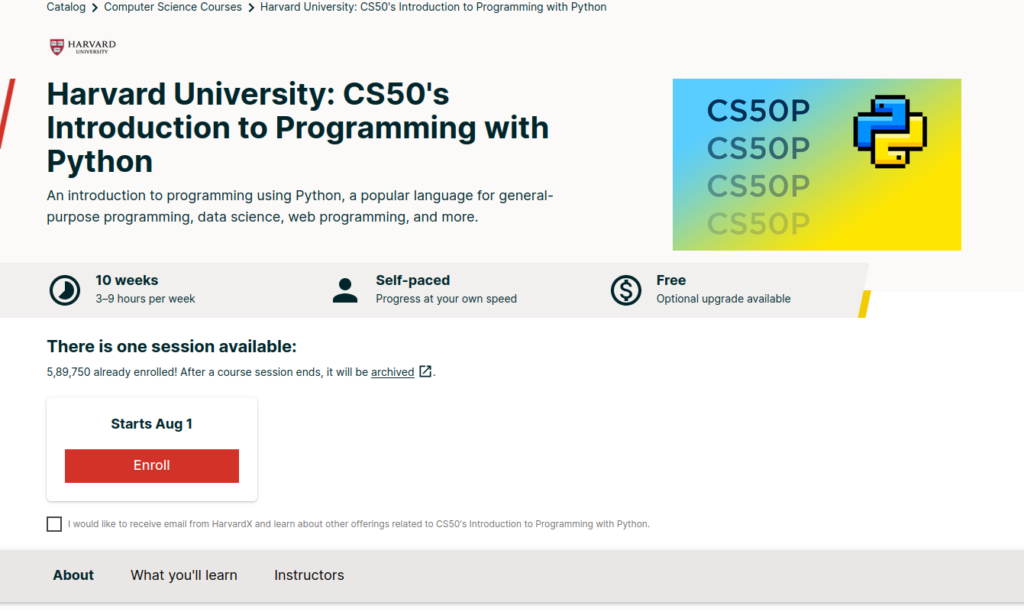
https://www.edx.org/course/cs50s-introduction-to-programming-with-python
7. Computer Science for Business Professionals:
- “Computer Science for Business Professionals” is a specialized course that caters to individuals with non-technical backgrounds, providing them with a comprehensive understanding of essential computer science concepts relevant to the business world.
- Participants will be introduced to various programming languages, demystifying technical jargon and equipping them with the ability to communicate effectively with technical teams and understand code-related discussions.
- The course emphasizes computational thinking, a problem-solving approach used by computer scientists, enabling business professionals to analyze complex problems, break them down into manageable steps, and propose efficient solutions.
- Students will explore internet technologies and web development principles, gaining insights into how online platforms function and the foundational components of modern websites and web applications.
- The course also introduces technology stacks and cloud computing, providing learners with knowledge about the infrastructure and services powering contemporary digital businesses, fostering informed decision-making when considering technology adoption and scalability. Overall, this course empowers business professionals to bridge the gap between technical and business realms, making them better equipped to thrive in an increasingly technology-driven business landscape.
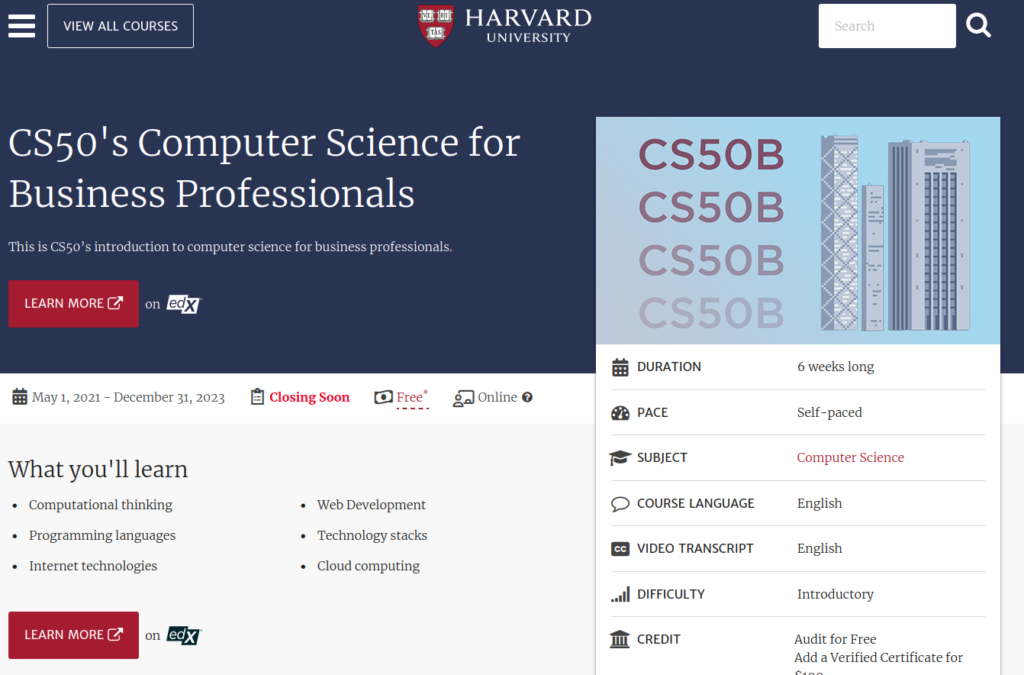
https://pll.harvard.edu/course/cs50s-computer-science-business-professionals-0
8. Web Programming with Python and JavaScript 2023:
- “Web Programming with Python and JavaScript 2023” is an advanced course that offers an in-depth exploration of web application development using the powerful combination of Python and JavaScript.
- Participants will acquire the necessary skills to design and implement sophisticated web applications, leveraging the strengths of Python for back-end development and JavaScript for front-end interactivity and user experience enhancement.
- The course emphasizes mastering web development frameworks, enabling students to become proficient in popular Python web frameworks like Django or Flask, and JavaScript frameworks like React or Angular.
- Through hands-on projects and real-world examples, learners will gain practical experience in building dynamic, responsive, and feature-rich web applications, ensuring they are well-prepared to tackle complex web development challenges.
- With a focus on the latest trends and best practices in web programming, this course equips participants to stay at the forefront of web development technologies, empowering them to excel in their careers as professional web developers in the dynamic and ever-evolving landscape of web programming.
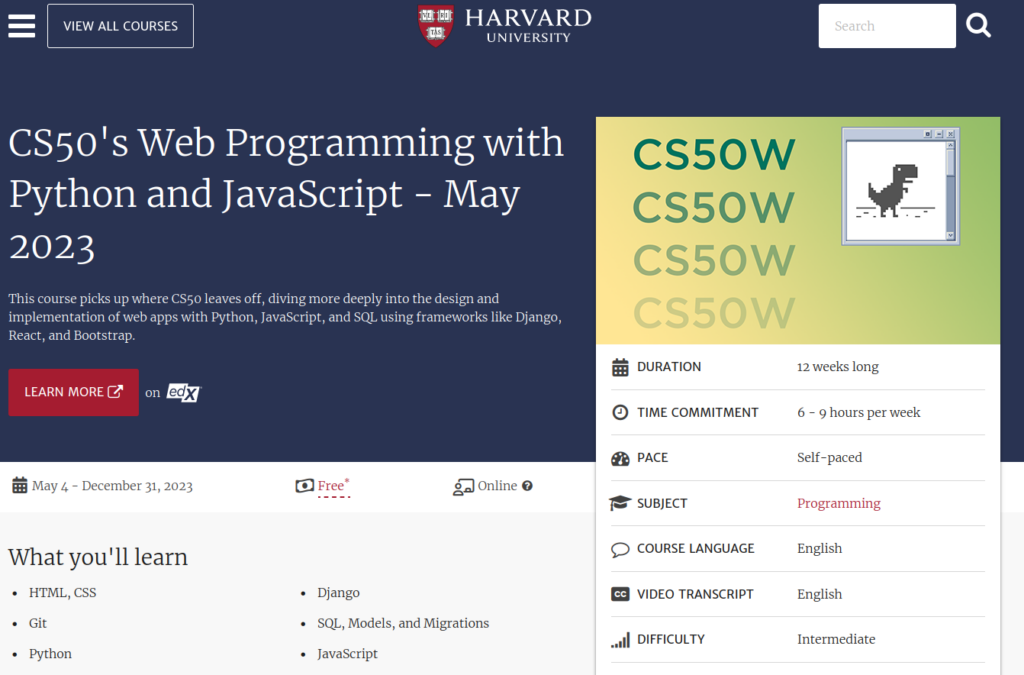
9. CS50’s Introduction to Game Development:
- “CS50’s Introduction to Game Development” is an exciting course that immerses participants in the world of game development, offering hands-on experience in creating both 2D and 3D games.
- Students will have the opportunity to explore and dissect popular and iconic games like Super Mario Bros., Pokémon, and Angry Birds, gaining insights into their design principles and mechanics.
- The course equips learners with the knowledge and skills to design and build their own interactive games, covering essential game development concepts, such as game loops, physics simulations, collision detection, and user input handling.
- Through practical projects and assignments, participants will apply their knowledge in game development, learning how to implement game mechanics, create game worlds, design levels, and incorporate audio-visual assets.
- By the end of the course, students will have a solid foundation in game development, enabling them to pursue further specialization in the field and potentially embark on a career in the dynamic and creative industry of video game development.
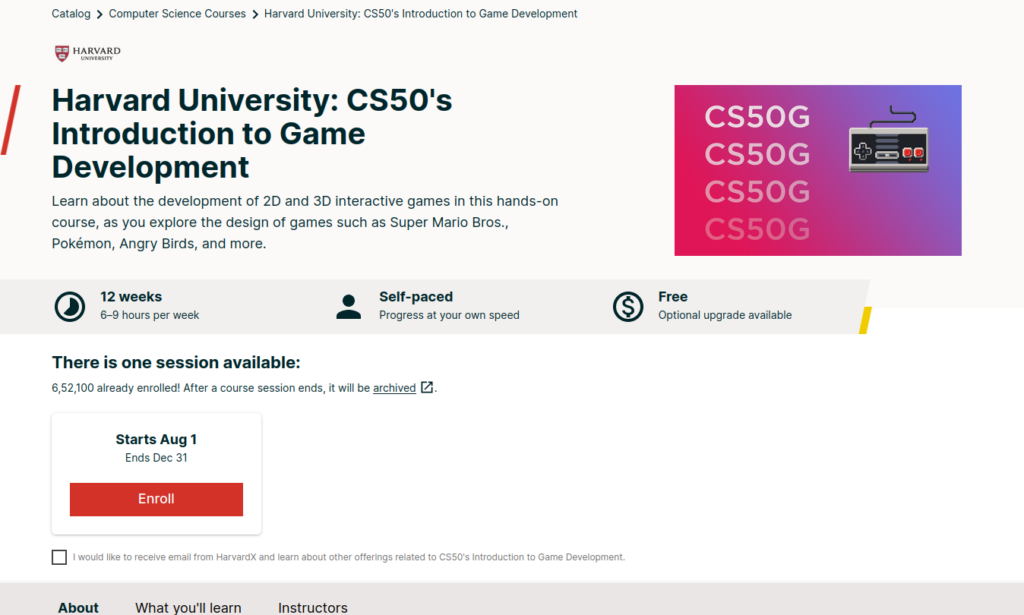
https://www.edx.org/course/cs50s-introduction-to-game-development
10. Introduction to Data Science with Python:
- “Introduction to Data Science with Python” is an engaging online course that introduces learners to the fundamentals of data science, with a focus on harnessing and analyzing data using the Python programming language.
- Participants will become proficient in utilizing popular Python libraries for data science, such as NumPy, pandas, Matplotlib, and seaborn, gaining essential tools for data manipulation, visualization, and exploratory analysis.
- The course provides a practical understanding of running basic machine learning models using Python, enabling students to apply regression, classification, and clustering algorithms to real-world datasets.
- Through hands-on exercises and coding projects, learners will practice using Python for data modeling, developing skills in data preprocessing, feature engineering, and model evaluation to derive valuable insights from data.
- By the end of the course, students will be equipped with the knowledge and practical experience to confidently engage in data science projects, making them well-prepared to tackle real-world data challenges and take the first steps towards a rewarding career in the data science field.
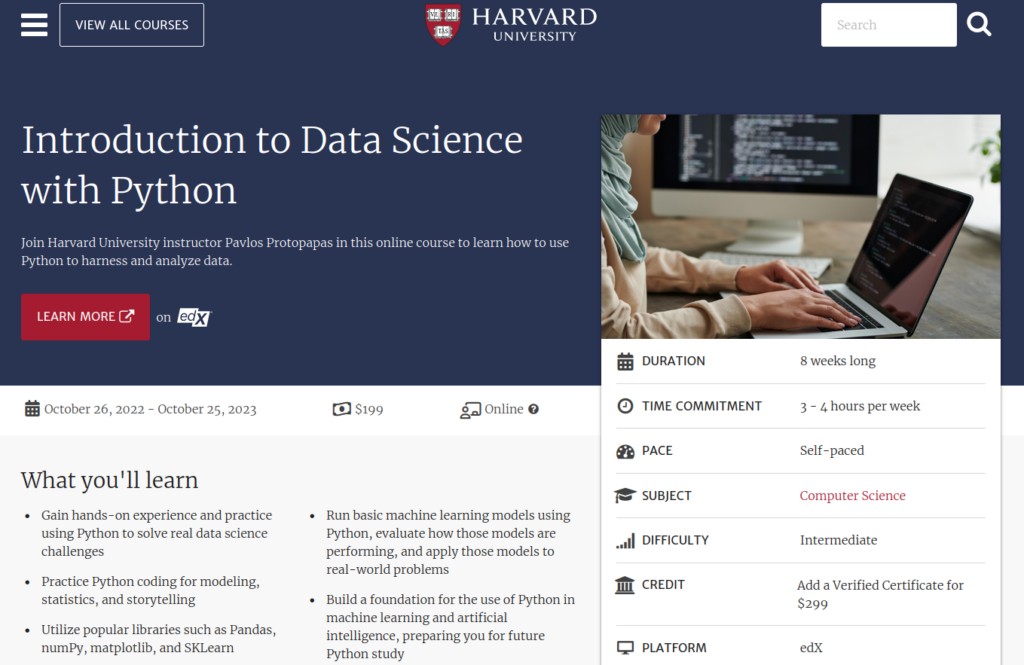
https://pll.harvard.edu/course/introduction-data-science-python
I highly recommend checking out these courses if you’re interested in learning about AI. They’re a great way to learn from the best, and they’re completely free!